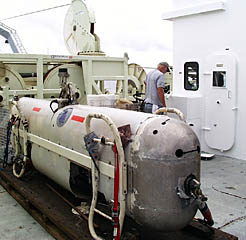|
|
TODAY'S WEATHER
There�s never enough time! After 41 days at sea, you would think that we’d be glad to be almost finished with our field work. But, no matter how long a cruise is, there is never enough time to collect all the data and samples we would like! We know that it will be several years before we can come back to this area to do more work. So we must collect as much information as possible to help us answer the scientific questions that brought us out here in the first place. Today we completed the last Argo II lowering of Expedition #3! As I write this journal, there is still lots of activity on board! Steve Gegg is processing the data, and copying it on to many data disks and CDs ready for us to take home. The science team is sorting through maps, making notes, and selecting images and videos of the highlights of our last 10 days of work at the Galapagos Rift valley. Mike Perfit and the watch standers are sending “Mighty-Mo”, the rock corer, hurtling down to the ocean bottom at 100 meters per minute to bash into the seafloor lava flows and collect chips of volcanic glass. We are planning to do 16 more rock cores and 4 dredges before we leave for Manzanillo on Saturday, May 6 at about 1200 hours local time. The DSL-120 sonar maps and the Argo II images have provided us with many interesting volcanoes and lava flows that we would like to sample. But -- time will not allow us to sample them all! Making the hard decisions about which are the important volcanic features to sample so that we can relate the volcanic activity here to the AHA seismic event observed 18 months ago is very frustrating! We have to constantly ask ourselves: “What data and samples will help us the most in answering the scientific questions, or hypotheses, we are investigating?” Our answer at this study site is to concentrate our sampling in the rift valley floor. With the time we have left, we are focusing on sampling the three main volcanoes, and several smaller volcanic cones and lava flows throughout the rift valley floor. Tonight will be a long one for Mike Perfit, the watch standers, “Mighty Mo”, and me! But we have schools of small mahi mahi (dolphin fish), flying fish, and squid to keep us company and entertain us in the evening drizzle. We also have thoughts of dry land, loved ones, and home- where we will be in less than a week!
|
|||||||||||||||||||||||||||||||||||||||||||||||||||||||||||||||||||||||||||||||||||||||||||||||||||||||||||||||||||||||||||||||||||||||||||||||||||||||||||||||||||
© 2010 Dive and Discover™. Dive and Discover™ is a registered trademark of
Woods
Hole Oceanographic Institution




